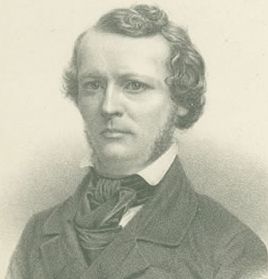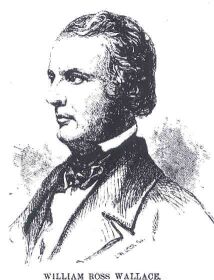|
William Ross Wallace
frontispiece William Ross Wallace, Meditations in America, and Other Poems Lewis Collins, 1 History of Kentucky 579 (Covington, Kentucky: Collins & Co., 1878)(rev. & enlarged, Richard H. Collins):
The National Cyclopaedia of American Biography 375 (New York: James T. White & Company, 1924)(vol. 8):
W.H. Venable notes that "one can understand, when reading his vigorous and well-wrought verses, why his contemporaries praised him, and we wonder, as in many other similar cases, why compositions so much above mediocrity should be forgotten so soon." [W. H. Venable, Beginnings of Literary Culture in the Ohio Valley: Historical and Biographical Sketches 280 (Cincinnati: Robert Clarke & Co., 1891)] [online text] [William Henry Venable] William
Ross Wallace William
Ross Wallace Marginalia
International Magazine of Literature, Art, and Science Poems A Mother's Hymn in Time of War [The Sword of Bunker Hill] [Choral Harp] [A Poem] Poetry William Ross Wallace, The Battle of Tippecanoe, Triumphs of Science, and Other Poems (Cincinnati: P. McFarlin, 1837) [online text] _________________, The Triumphs of Science, A Poem, Delivered before the Whig Society of Hanover (Indiana) College, at their Anniversary, Wednesday Evening, Sept. 28, 1836 (Louisville, Kentucky: Western Presbyterian Herald, 1837) _________________, Wordsworth, a Poem (New York: Huntington and Savage, 1846) _________________, Meditations in America, and Other Poems (New York: C. Scribner, 1851) [online text] [review] _________________, Prattsville an American Poem (New York: J.F. Birch, 1852) [online text] _________________, Progress of the United States: Henry Clay, an Ode "Of thine own country sing" (New York: D.J. Field, 1856) _________________, The Liberty Bell (New York: J.G. Gregory, 1862) Writings William Ross Wallace, Alban the Pirate, A Romaunt of the Metropolis (New York: Berford, 4th ed., 1848) ________________ (ed.), The Loved and the Lost (New York: [s.n.], Richards & Jones, printers, 1856)(New York: W.G. Cordray, 4th ed., 1860) _________________, (ed.), Patriotic and Heroic Eloquence: A Book for the Patriot, Statesman and Student (New York: J. G. Gregory, 1861) [online text] Research Resources William Ross Wallace Papers |

